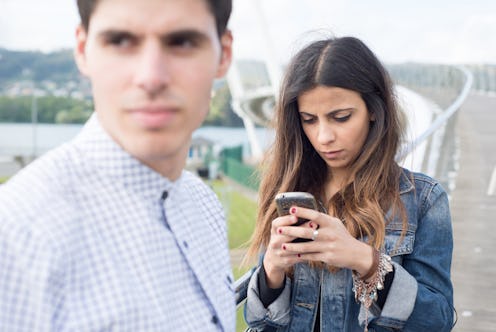Life
6 Things You Need To Know About Phubbing aka Phone Snubbing

Whether you realize it or not, you've probably been guilty of phone snubbing, aka "phubbing," at some point in your life. But what exactly is phubbing? It's the practice of ignoring someone — whether that's your partner, friend, or family member — in favor of your smartphone. Though it might not sound like the worst of all the bad dating behaviors out there, a recent study by Baylor University found that the way we use (or perhaps overuse) our cell phones might be damaging our romantic relationships.
After researchers conducted an initial survey to identify phone snubbing behaviors, they asked participants in a second survey to measure the prevalence of "pphubbing" (partner phone snubbing) in their romantic relationships. They found that 46 percent of people had been phubbed by their partner, and 22 percent said the phubbing caused conflict in their relationship. So how do you know if you're guilty of chronic phubbing?
"You might be a phubber if time away from your phone, even for a minute or two, results in serious anxiety," Jonathan Bennett, relationship/dating coach and owner of The Popular Man, tells Bustle. "You can’t fully focus on the person talking to you because you’re worrying that you’ll miss a text, Instagram post, or that new person viewing your Snapchat story."
Even though checking your phone at the dinner table might *seem* harmless, over time, that behavior may drive a wedge between you and your partner. Here are six things you need to know about phubbing — even if you aren't a chronic phubber, it's always a good idea to peel your gaze away from your phone and focus on your partner a little more.
1Phubbing Is Linked To Depression
According to a study conducted by researchers at the Renmin University of China, couples who had been married for more than seven years who were being phubbed by their partner were more likely to report being depressed. However, researchers noted that this effect was indirect: phubbing lead to decreased relationship satisfaction, and this decrease in relationship satisfaction is what caused the higher reported depression scores.
2Your Attachment Style Impacts How You Handle Phubbing
According to the abstract from the Baylor University study: "One's attachment style was found to moderate the Pphubbing — cell phone conflict relationship. Those with anxious attachment styles reported higher levels of cell phone conflict than those with less anxious attachment styles."
So if you're one of the 20 percent of people with an anxious attachment style, you might be more negatively impacted by a partner who engages in phubbing — because it will feel more like a personal rejection than just a mildly irritating habit — which could, in turn, cause more conflict in your relationship.
3Ignoring Your Friends Is A Sign Of Phubbing
Have you ever found yourself so absorbed in what's on your phone that you're hardly aware of what's going on around you? "A good sign [of phubbing] is that when people are talking to you, you often can’t remember what they even told you and are forced to give fake answers or ask them to repeat themselves," Bennett says.
If this sounds like you in most social situations, there's a good chance that your phubbing behavior is super noticeable — and probably irritating your friends or romantic partner.
4Phubbing Can Make Others Feel Unimportant
Nowadays, we're all so accustomed to having our phones in our hands that we might not even realize when our phone use is crossing an invisible boundary — going from normal Millennial behavior to being neglectful of those around you.
"[Phubbing] can hinder rapport building with other people," Bennett says. "You might think you’re giving the other person enough attention, but no one wants to take second place to an electronic device."
5Phubbing Diminishes Your People Skills
When you're out in public and can't be bothered to look up from your phone, you're likely to miss out on opportunities to connect with people IRL and practice important communication and social skills.
"You lose valuable people skills [when phubbing]," Chad Elliot, a confidence and communication coach, tells Bustle. "When important social opportunities arise, you're more likely to make an irreversible mistake because of poor habits."
6Mindfulness Can Help You Eradicate Phubbing
FOMO is a very real thing, so it's understandable to feel attached to your phone and always want to be plugged in to what's happening with those who you aren't physically around. But if you want to ease your phone-related anxiety and focus on spending quality time with those you're actually with, it's worthwhile to put away your phone every now and then.
"Learn to practice mindfulness," Bennett suggests. "Find joy in the present moment instead of always needing to distract yourself with your phone. If you start to get anxious, take a few deep breaths, focus on your breathing, and reorient your mind to your present experience, rather than your anxiety about your phone."
You don't have to totally abandon your phone to break your phubbing habits, but being mindful of how you're using your phone can make a huge difference. If you're willing to take a mini digital detox and put your phone away when you're around friends, family, and your partner, you'll probably find that all your relationships improve and you're better able to enjoy the moment you're in IRL.